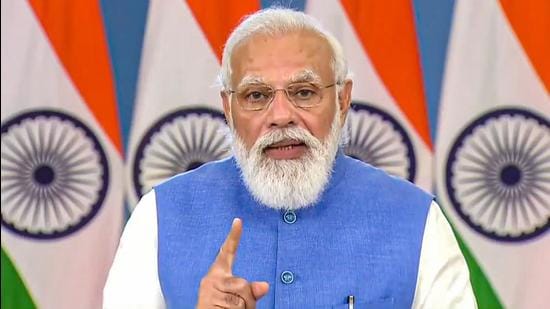Modi redefined, refined and reoriented reforms with a focus on the vulnerable
Without the ultimate consumer of goods and services — the citizen — no reform can survive, industry can’t sustain itself, markets can’t expand, exports won’t surge, farmers won’t proposer, and India’s growth story can’t continue. And that is why the definition of reforms must be broad and take into account the most vulnerable.
Before a lesser-known Narendra Modi took over as chief minister (CM) of Gujarat on October 7, 2001, the state had a notorious history of droughts and other natural calamities. Its growth engine had stopped whirring. CM Modi transformed the state and made it synonymous with development and prosperity.

After becoming the longest-serving CM of Gujarat, he took over as prime minister (PM) seven years ago. His uninterrupted 20 years in public office have established him as a man of development. His economic vision unfolded his idea of reform, which laid heavy emphasis on delivery to the lowest common denominator.
After he assumed power in Delhi, the electorate saw Modi as a mass leader, and may not have expected much by way of reforms. But to achieve his goals, PM Modi streamlined administration, underpinning his philosophy of minimum government and maximum governance. He got rid of corruption and provided a clean governance model.
This was no easy feat for PM Modi, considering the 10-year rule of the United Progressive Alliance (UPA), which was riddled with corruption, scandals and financial frauds. Manmohan Singh’s government was crippled by a policy paralysis never before seen in India’s post-Independence history. His coalition politics pulled the administration in different directions and it needed a massive administrative overhaul.
In this context, PM Modi’s successes seem more appreciable. Indeed, the people of India were not let down by Modi. He kept at bay powerful dealmakers and lobbyists with clout. He set in motion reforms that hitherto were unimagined by the Grand Old Party and its reform brigade that aggressively defined economic restructuring as “striking sweetheart deals” favouring a few industrialists, multinational corporations, and market-makers sans transparency.
Economic, administrative and governance reforms were reoriented by the Modi government to take fruits of opening up to the last man, as it firmly believed in the Bharatiya concept of antyodaya (the rise of the last person). Scores of examples can be offered to illustrate how governance was taken to grassroots and the rewards of reforms were reached to the poorest.
Congress governments that were wedded to Nehruvian socialism fell flat owing to outdated policy frameworks. They were unable to calibrate reforms to benefit millions of vulnerable people.
In the Modi era, reforms are working. This is because the focus areas were defined and the emphasis is on delivery. Taking banking to people’s doorstep through Pradhan Mantri Jan Dhan Yojana by opening over 430 million accounts with over 1,26,000 bank mitras (agents) working round the clock in unbanked areas is just one example.
Not many gave this government a chance when PM Modi announced clean cooking gas connections for all under his Ujjwala Yojana. It has been a roaring success with over 81.665 million cooking gas connections provided mostly to women who struggled to cook a square meal every day. Ujjwala 2.0 was also launched with 1.669 million cooking gas connections provided as of September 7, 2021.
While Manmohan Singh emphasised tackling macro-economic issues, the Modi government served the fruits of reforms and the India growth story to the people. Achieving financial inclusion is the biggest reform success story globally. Over ₹15 lakh crore was spent on close to 290 million beneficiaries to strengthen grassroots entrepreneurship — unparalleled in banking history worldwide.
Providing safe drinking water to the common man was never prioritised in Independent India’s history, leading to the rapid spread of water-borne diseases. The Jal Jeevan Mission is the biggest reform that any country has dared to launch. Thanks to the dedicated mission, over 81 million households today have access to clean drinking water. Of this, close to 50 million households got water connections only after August 15, 2019, when the water mission became operative.
Could Nehruvian neo-liberalists have imagined the idea of a new India where every family has a roof over its head? They would have come up with scores of excuses from a fund crunch to limited economic absorption capacity.
Here’s a government that was so unfairly attacked as “suit-boot ki sarkar”. And, it had the gumption to announce 5.4 million houses for people in cities and 10 million more for the poor in villages. If housing for all is not a people-oriented reform measure, then what else is? On April 28, 2018, when the last village in Manipur, Leisang, was provided electricity, it was a big deal. The Modi government will go down in history as the one that provided electricity to all the 5,97,000 villages after Independence.
Such initiatives make up the top of the long list of reforms unveiled by this government.
This government has not only achieved what very few did, but in the process also redefined reforms. Reforms in the pre-Modi era were defined by opening up the economy and reduction in taxes to corporate.
Today, reforms have been rewritten by making governance delivery-oriented. Simplifying economic reforms and reorienting development parameters do not necessarily mean that the government is anti-markets or anti-industry.
Without the ultimate consumer of goods and services — the citizen — no reform can survive, industry can’t sustain itself, markets can’t expand, exports won’t surge, farmers won’t proposer, and India’s growth story can’t continue. And that is why the definition of reforms must be broad and take into account the most vulnerable.
Syed Zafar Islam is a Member of Parliament, national spokesperson, BJP, and former managing director, Deutsche Bank, India.
The views expressed are personal
All Access.
One Subscription.
Get 360° coverage—from daily headlines
to 100 year archives.



HT App & Website







